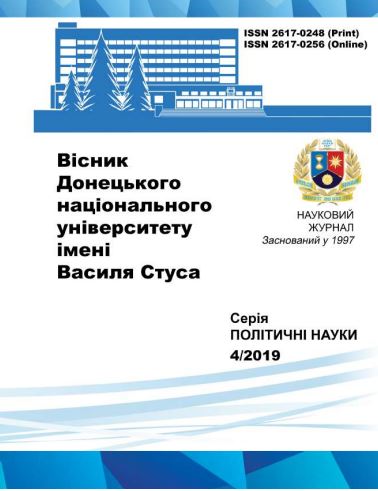Мodern political humor as polyfunctional phenomenon.
DOI:
https://doi.org/10.31558/2617-0248.2019.4.15Keywords:
humor, political humor, politics carnavalisation, forms and functions of political humorAbstract
Political humor is a complicated phenomenon with its scientific reflection occurring in two major dimensions. On one hand, under the conditions of politics complication, politisation of various social aspects, permanent critical state of government, humor conducts the role of a tool to comprehend the politics with its current state, events and personalities. On the other hand, political humor is integral element of modern politicians’ public image who are supposed to act like «one of the guys» with the help of a certain political technology. Politics can be considered as a state of dual opposition, where humor and seriousness are two poles of such an opposition.
Political humor is a polyfunctional phenomenon. General functions of political humor are: emancipating, critical, evaluative, integrative and more. Political humor is a contextual phenomenon with its functions, types and forms being dependent on political regime of a society. Forms of political humor are also flexible and can include satire, irony, grotesque and caricature. In a modern cultural dimension one of the most solicited form of political humor is the Internet – memes, slogans, viral videos and more. Despite the vast amount of folk art, the biggest channel of humoristic representation in modern Ukraine is professional humor, provided by media.
With all that, even risky political attacks cannot be classified as sharp political satire as their social criticism is too soft and does not urge to fight against the flaws. The government ignores this humor and even agrees to become the subject of it, which leads to the political humor softening, the loss of revealing function and adopting the entertainment feature. Another aspect of political humor problems is its usage as political technology for modern political leaders.
References
Бергсон А. Смех. М.: Искусство, 1992.168 с.
Дмитриев А.В., Сычев А.А.Смех: социофилософский анализ. М.: Альфа-М, 2005. 594 с.
Карасев, Л.В. Мифология смеха. Вопросы философии, 1991. №7. С. 68 – 86.
Иванюшкин А.А. Политический юмор как философско-эстетическая категория: сущность и специфика. Софист: социолог, философ, историк (Сб. науч. трудов). Вып. I. М.: МПГУ 2005. С. 61 – 69.
Дмитриев А.В. Социология политического юмора. М.: Росспеин, 1998. 214 с.
Фуко М. Воля к истине: по ту сторону знания, власти и сексуальности. Работы разных лет. Пер. с франц. М.: Касталь, 1996. 448 с.
Разуваев В.В. Политический смех в современной России. М.: Изд. Дом ВШЭ, 2002. 386 с.
Иванюшкин А.А. Политический анекдот как одна из основных форм проявления политического юмора в обществе. Софист: социолог, философ, историк (Сб. науч. трудов). Вып. I. М.: МПГУ 2005. С. 69 – 73.
Benton G. The Origins of the Political Joke /Humour in Society: Resistance and Control. Paton, G.E., Powell, C., Venezia, L., Frailing, K. New York: St. Martin's Press, 1988. Р. 33-55.
Фокина М.А. Демотиваторы в России и США: новые жанры интернет-коммуникации в глобализированном мире. Вестник НДЛУ им. Н.А. Добролюбова. 2012. № 20. С. 74 – 85.
Рейфман П.С. Из истории российской, советской и постсоветской цензуры. URL: https://www.gumer.info/bibliotek_Buks/History/reifm/index.php – дата звернення 5.11.2019.
Липовецки, Ж. Эра пустоты. Эссе о современном индивидуализме; перев. с фр. В.В. Кузнецова; под общ. ред. Л.А.Краско. М.: Изд. Владимир Даль, 2001. 336 с.
Иванюшкин А.А. Карнавализация избирательной кампании как политическая технология. Социальное образование: проблемы и перспективы. 2004. №4. С. 55 – 60.
Эко У. Заметки на полях «Имени розы». СПб.: «Симпозиум», 2007. 92 с.
Сувалко А. С. Эмоциональный капитализм: коммерциализация чувств. М.: Изд. Дом Высшей школы экономики, 2013. 48 с.

